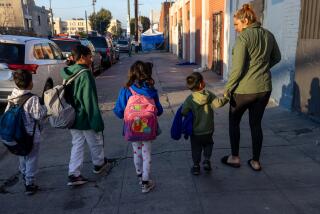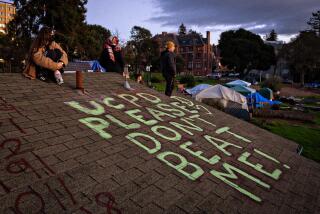Council OKs Controversial Shelter : Government: The approval of a Barrio Logan shelter for homeless women and children prompts charges of racism from opponents.
- Share via
The San Diego City Council ignored a recommendation by the Planning Commission and approved plans for a controversial shelter in Barrio Logan for homeless women and children.
Council members approved the Rachel Grosvenor Family Center Tuesday night by a 7-2 vote in a heated session that saw supporters and opponents of the project pack the council chambers. The San Diego Planning Commission had voted down the project in December.
After Tuesday’s council meeting, angry opponents of the shelter leveled charges of racism against Mayor Maureen O’Connor and other council members who voted for the project. Some Barrio Logan residents called the council’s action “another racist vote against our community.”
Opponents noted that Councilmen George Stevens and Bob Filner, who represent largely black and Latino districts, were the only council members who voted against the shelter.
“The people on the council (who voted for the facility) are reflecting the views of their constituents, who are saying, ‘Not in my back yard,’ ” said Al Ducheny, head of a community group organized to stop the shelter. “They’re saying dump them (homeless women and children) with the poor, blacks and Hispanics, and we will give you some money to take care of them. But we don’t want them in our communities.”
The site for the 130-bed center was purchased partly with a $1-million donation from Judson and Rachel Grosvenor, members of a prominent San Diego family. The San Diego Rescue Mission, which will operate the center, paid $1.8 million for the site at 16th Street and National Avenue.
Rescue Mission officials estimated it will cost an additional $2 million to renovate the cavernous warehouse that will house the shelter.
Al Busse, director of development for the Rescue Mission, could not be reached for comment Wednesday. But in an earlier interview, Busse said the facility was needed because there are only 277 beds for homeless women and children available in the entire county.
Ducheny and other opponents argued that about half of the city’s 182 residential care facilities are located in Barrio Logan and Southeast San Diego. Barrio Logan residents charged that indifferent council members routinely “dump” shelters for the homeless, drug addicts and paroled felons in their community. Barrio Logan, a community of about 3,000 mostly Latino and black residents, has one of the highest crime rates in the city.
Opponents of the shelter argued that it violated a city ordinance that requires a quarter-mile separation between residential care facilities. The Rachel Grosvenor Center is located less than two blocks from both the 350-bed St. Vincent de Paul-Joan Kroc Center and the 150-bed St. Vincent de Paul-Bishop Maher Center.
In addition, the Grosvenor Center is one block from a shelter that houses 45 paroled felons.
Despite the ordinance, the city attorney advised officials that they can use their discretion when considering the quarter-mile law.
Ducheny and other opponents of the shelter singled out O’Connor for criticism, arguing that she was the force behind the move to approve the facility. In November, Busse acknowledged that O’Connor was an enthusiastic supporter of the project.
“The mayor has historically voted each time to dump these facilities in our community, while patronizing us at the same time,” Ducheny said.
O’Connor spokesman Paul Downey said that the mayor’s support for the shelter “was motivated by compassion.”
“The mayor expressed sadness over being placed in a position of caring for homeless women and children versus the concerns of the community. It was a no-win situation,” Downey said.
He denied that the council vote was racially motivated and brushed aside Ducheny’s charges of racism.
In order to allay residents’ fears that the shelter will attract transients who hang around the facility, O’Connor ordered city officials to temporarily review the center’s operation on a quarterly basis, Downey said.
Normally, reviews of residential care facilities are done on an annual basis, he added.
“The mayor made it abundantly clear that if they were a fraction of an inch out of line, they would be shut down,” Downey said.
More to Read
Sign up for Essential California
The most important California stories and recommendations in your inbox every morning.
You may occasionally receive promotional content from the Los Angeles Times.













